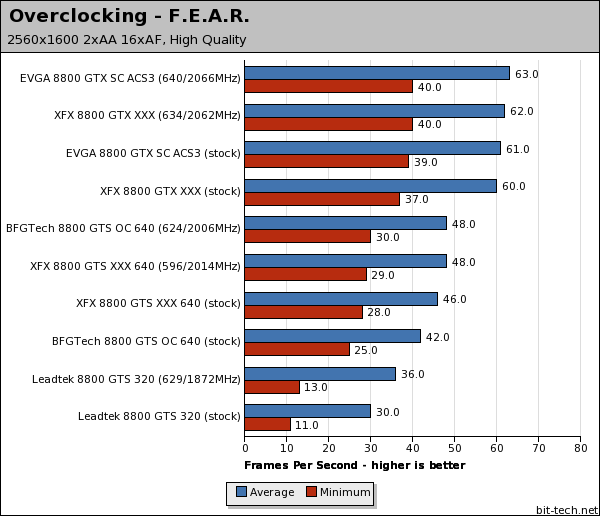GeForce 8800 series round-up
February 20, 2007 | 15:51

Overclocking:
We overclocked all five GeForce 8800's using a combination of Nvidia's nTune software and ATiTool version 0.26 (which supports overclocking GeForce 8800-series video cards). While the current driver doesn't have support for shader clock adjustments yet, Nvidia has promised that feature in a future driver release. The ETA on that driver is not clear at this moment in time, though.The default clocks for the cards are as follows:
- BFGTech GeForce 8800 GTS OC 640MB: 550MHz core / 1600MHz memory;
- EVGA e-GeForce 8800 GTX KO Superclocked ACS³ Edition: 626MHz core / 2000MHz memory;
- Leadtek WinFast PX8800 GTS TDH 320MB: 513MHz core / 1600MHz memory;
- XFX GeForce 8800 GTS 640MB XXX Edition: 550MHz core / 1800MHz memory;
- XFX GeForce 8800 GTX 768MB XXX Edition: 630MHz core / 2000MHz memory.
And here's where we ended up after some blood, sweat and tears. Oh, and a bit of overclocking, too...
- BFGTech GeForce 8800 GTS OC 640MB: 624MHz core (13.5 percent increase) / 2006MHz memory (25.4 percent);
- EVGA e-GeForce 8800 GTX KO Superclocked ACS³ Edition: 640MHz core (2.2 percent) / 2066MHz memory (3.3 percent);
- Leadtek WinFast PX8800 GTS TDH 320MB: 629MHz core (22.6 percent) / 1872MHz memory (17 percent);
- XFX GeForce 8800 GTS 640MB XXX Edition: 596MHz core (8.3 percent) / 2014MHz memory (11.9 percent);
- XFX GeForce 8800 GTX 768MB XXX Edition: 634MHz core (0.6 percent) / 2062MHz memory (3.1 percent).


MSI MPG Velox 100R Chassis Review
October 14 2021 | 15:04








Want to comment? Please log in.